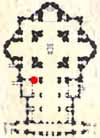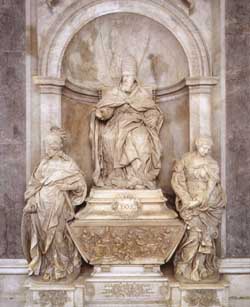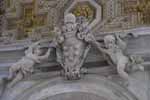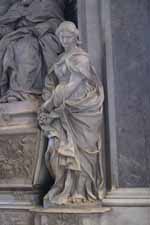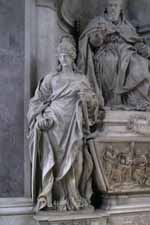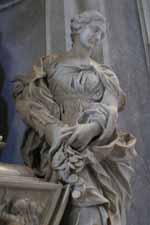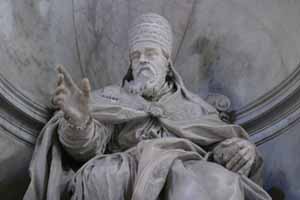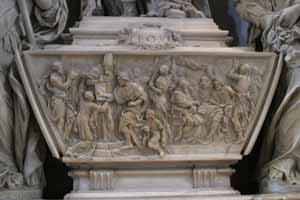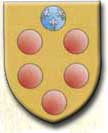 |
| Grottoes
Vatican City Colonnade Saints Floorplan #2 |
| Altars
Monuments The History |
|
Related Sites |
|
This white marble Monument to Leo XI is by Alessandro Algardi (1595-1654). The roses carved on the plinth and the inscription "Sic florui", refer to the fact that he reigned only 27 days, in 1605. Beside him are two female allegories: Fortitude and Generosity. The scene below is the abjuration of Protestantism made by Henry IV of France when Leo was apostolic nuncio, and the signing of a peace treaty between Spain and France.
|
From: 'St. Peter's Basilica - A Virtual Tour'
by Our
Sunday Visitor
The two female statues, Fortitude by E. Ferrata and Generosity by G. Peroni,
are certainly among the most convincing allegorical figures of all the
funeral monuments in the Basilica. The wording "Sic florui" accompanying
a bunch of roses at the base, is an allusion to the brevity of Leo XI's
Papacy (only 27 days) even though as a cardinal he had had a leading role
in the previously mentioned conversion of the king of France.
From:
'THE NEW SAINT PETER'S'
In the aisle to the right we note the tomb of Leo XI Medici, in white
marble, by Alessandro Algardi (1645-1646). It is constructed after the
model of the monument to Urban VIII but on a smaller scale. The Pope,
with a gentle paternal expression, extends his hand toward the faithful;
below are the figures of the Majesty of the Kingdom and Liberality, composed
and austere. The epitaph reads: Ostensus magis quam datus, and the words
sic florui are written on the lateral friezes; and indeed this Medici's
blossoming was short-lived - 27 days as Pope - like that of the wilted
roses that decorate the monument. The bas-relief commemorates the abjuration
of Henry IV of France (1593) in the presence of Medici while he was Clement
VIII's Legate.
From: 'The Basilica
of St Peter's in the Vatican', Franco Cosimo Panini, 2000
The tomb of Alessandro de' Medici, a member of a minor branch of the famous
Florentine family, who was born in 1535 and reigned as pope for only twenty-seven
days in 1605, was commissioned by his nephew Cardinal Roberto Ubaldini
from Alessandro Algardi, who worked on it from 1634 to 1644. The statue
of the pontiff is inside a niche, above a sarcophagus bearing a medallion
with the dedication and a relief showing two episodes from the life of
the pope. At the sides there are allegorical statues of Magnanimity (left)
and Liberality (right), by Ercole Ferrata and Giuseppe Perone. Above the
niche, a pair of angels support Pope Leo's arms, as they attempt to fix
it to the cornice with strings.
From: 'Guide to
St Peter's Basilica' © 2003 Libreria Editrice Vaticana
On 21st July 1634 Cardinal Roberto Ubaldini, the pope's nephew, commissioned
to Alessandro Algardi the monument on the right of the passage leading
into the left-hand aisle. It was completed on 26th December 1644, but
unveiled to the public only on 23rd June 1652.
Leo XI was a member of the famous Medici family and a grandnephew of Leo
X. But while Leo X was a thoroughgoing Renaissance prince, his grandnephew
was a true Counterreformation pope. One typical Medici quality was shared
by both, a love for literature and art. He was a close friend of St. Philip
Neri, and active in introducing the Tridentine reforms.
He helped to persuade Clement VIII to absolve Henry IV of France (1589-1610) from excommunication, being himself appointed legate in France in Apr. 1596.
Easter Sunday, April 17, the coronation day of Leo, was a gala occasion for the Romans, but for Leo himself it was deadly. The old man caught a chill during the ceremonies and soon was in bed fighting vainly for his life. When it became evident that he was going to die, appeals rained on him to make a nephew a cardinal. Although the candidate was worthy, Leo had so great a horror for this rather common papal failing, that he repeatedly refused. Indeed when his confessor added his voice to the general pleading, Leo exchanged his confessor for another more prudent or detached.
